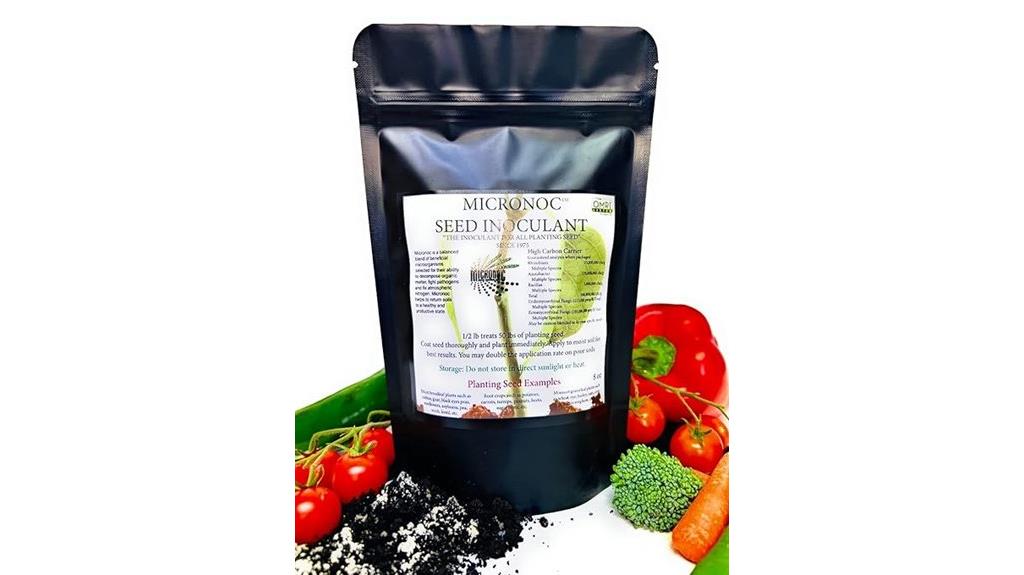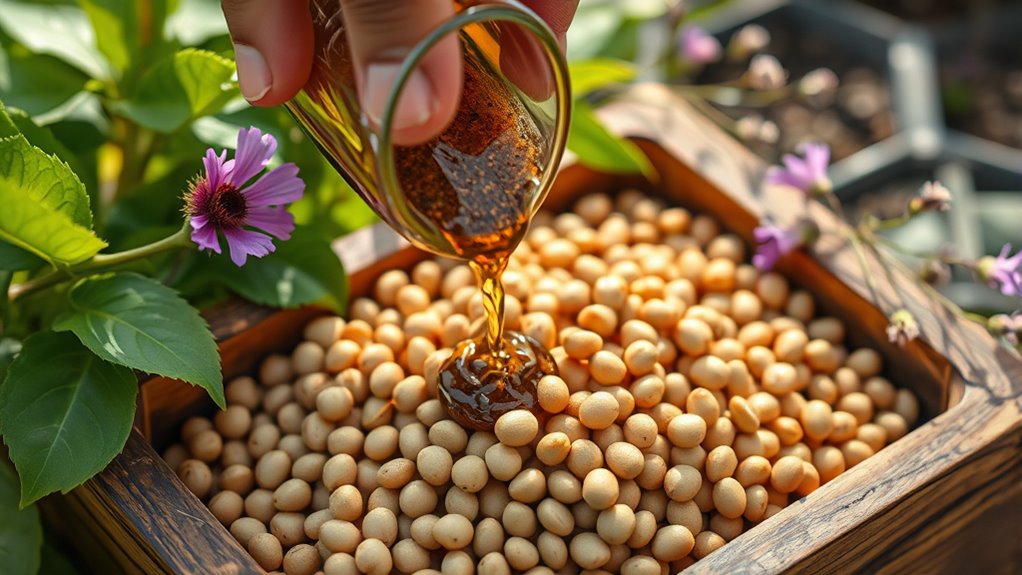If you’re looking for the best organic inoculants to boost legume growth naturally, I recommend products like granular and powder formulations tailored for beans, peas, and cover crops. These inoculants contain beneficial microbes such as mycorrhizal fungi and rhizobia strains that enhance nitrogen fixation, root development, and soil health. They’re safe for organic gardening and improve yields sustainably. Keep exploring to discover more about choosing the right inoculant for your garden.
Key Takeaways
- Look for OMRI-listed inoculants containing diverse, high-performing mycorrhizal fungi strains specifically formulated for legumes.
- Choose formulations compatible with your seed type and soil pH (6.0–7.5) to maximize nitrogen fixation and root development.
- Opt for application methods like seed coating, mixing, or soil inoculation to ensure effective microbial colonization.
- Select products with proven microbial viability, proper storage instructions, and suitable shelf life for consistent results.
- Prioritize eco-friendly, organic-certified inoculants that support sustainable gardening and soil health enhancement.
Park Seed Nature’s Aid Garden Soil Inoculant

If you’re looking for an easy-to-use inoculant that boosts soil fertility for legumes, Park Seed Nature’s Aid Garden Soil Inoculant is an excellent choice. I love how it promotes nitrogen fixation naturally, supporting healthy roots, lush foliage, and higher yields. With just 8.7 ounces, it covers up to 150 feet of row, making it cost-effective and simple to apply—just sprinkle it into the soil during planting. The granular formula activates immediately without mess, saving me time and effort. It’s specifically formulated for beans, peas, vetch, and lima beans, creating ideal conditions for nutrient absorption and promoting sustainable gardening practices.
Best For: home gardeners and small-scale growers seeking an easy, natural way to boost soil fertility for legumes like beans, peas, vetch, and lima beans.
Pros:
- Promotes natural nitrogen fixation, reducing the need for synthetic fertilizers
- Easy to apply with a dry granular format that activates immediately
- Cost-effective, covering up to 150 feet of row per 8.7 oz
Cons:
- Not formulated for soybeans, limiting crop compatibility
- May require reapplication each season for sustained benefits
- Only suitable for legumes, so not versatile for other plant types
Legume Powder Inoculant for Cover Crops (2.5 Oz)

The Legume Powder Inoculant for Cover Crops (2.5 Oz) from Mountain Valley Company is an excellent choice for farmers and gardeners looking to boost the success of their legume cover crops. This powder enhances seed performance by encouraging root nodule development, which improves nitrogen fixation and soil fertility. It’s suitable for a variety of legumes like lentils, peas, beans, and vetch. Applying this inoculant helps establish healthy, productive cover crops that repair soil, improve water retention, and suppress weeds. It’s perfect for use across seasons, especially when rehabilitating poor soils, ensuring your cover crops thrive and support future planting success.
Best For: Farmers and gardeners seeking to enhance their legume cover crop success, soil fertility, and weed suppression through natural nitrogen fixation.
Pros:
- Promotes healthy root nodule development, improving nitrogen fixation and soil enrichment
- Suitable for a variety of legumes including lentils, peas, beans, and vetch
- Easy-to-use powder format that supports all-season application and soil rehabilitation
Cons:
- May require proper mixing and application techniques to ensure effectiveness
- Limited to 2.5 oz, which might require multiple applications for larger planting areas
- Does not contain other soil amendments or fertilizers, focusing solely on rhizobia bacteria
Seed Inoculant, Organic Fertilizer for Soil & Germination

For gardeners and farmers seeking an organic solution to boost seed germination and soil health, seed inoculants offer a proven approach. These organic fertilizers contain beneficial microbes like nitrogen-fixing bacteria, phosphate solubilizers, and helpful fungi that decompose organic matter and improve nutrient availability. Suitable for all seed types—including legumes, vegetables, grains, and potted plants—they enhance germination rates, root development, and plant resilience. Easy to apply—just coat seeds and plant into moist soil—they also improve soil structure, water retention, and long-term fertility. With OMRI-listed formulas, seed inoculants support sustainable growth naturally and cost-effectively.
Best For: gardeners and farmers looking for an organic, easy-to-use solution to improve seed germination, soil health, and crop yields across various plant types.
Pros:
- Contains beneficial microbes that enhance nutrient availability and soil ecosystem.
- Easy application—simply coat seeds and plant into moist soil with no complex preparation.
- OMRI listed, ensuring the product is compliant with organic standards and suitable for sustainable gardening.
Cons:
- Some users report inconsistent results, possibly due to seed quality or application conditions.
- Effectiveness may vary depending on soil conditions and seed type.
- Requires moist soil for optimal application, which may not always be feasible in dry environments.
DYNOMYCO Granular Mycorrhizal Fungi Inoculant (100g/3.5oz)

DYNOMYCO Granular Mycorrhizal Fungi Inoculant is an excellent choice for gardeners seeking a natural way to boost root growth and improve yields. It contains 900 propagules per gram of live spores, hyphae, and root fragments, ensuring active, effective mycorrhizae. Certified OMRI Listed and ECOcert approved, it’s free from synthetic additives and heavy metals, making it safe for the environment. The granular formula easily treats up to 20 plants per pouch and can be used in various setups, including soil, containers, and raised beds. It promotes stronger roots, better nutrient uptake, and increased resilience against stress, leading to healthier, more productive plants.
Best For: home gardeners, organic growers, and sustainable farms seeking to naturally enhance root development, crop yields, and soil health without synthetic chemicals.
Pros:
- Contains 900 live propagules per gram, ensuring active and effective mycorrhizae.
- OMRI Listed and ECOcert approved, guaranteeing safety and organic compliance.
- Versatile application suitable for indoor, outdoor, container, and raised bed gardening.
Cons:
- Granular formula may require careful measurement to avoid over-application.
- Effectiveness can vary depending on soil conditions and plant species.
- Needs consistent application during planting or transplanting for optimal results.
Park Seed Nature’s Aid Garden Soil Inoculant

If you’re looking for an easy-to-use inoculant that boosts soil health and crop yields for legumes, Park Seed Nature’s Aid Garden Soil Inoculant is an excellent choice. It contains live nitrogen-fixing bacteria, such as bradyrhizobium and rhizobium leguminosarum, which naturally improve the nitrogen cycle. This promotes healthier root growth, stronger foliage, and higher vegetable yields. The granular formula is simple to apply—just sprinkle directly into the soil during planting. With enough product to treat up to 150 feet of row, it’s a cost-effective, low-maintenance way to enhance soil fertility and support sustainable gardening practices.
Best For: home gardeners and small-scale growers seeking an easy, natural way to boost soil fertility and increase yields for legumes like beans, peas, and vetch.
Pros:
- Easy to apply with no mess—simply sprinkle directly into soil during planting.
- Promotes natural nitrogen fixation, reducing the need for synthetic fertilizers.
- Cost-effective, covering up to 150 feet of row with just 8.7 oz.
Cons:
- Not formulated for soybeans, so it’s limited to certain legumes.
- Effectiveness depends on proper soil contact and application timing.
- May require reapplication in successive seasons for optimal soil health.
Myco Bliss Powder (200 g) – Mycorrhizal Fungi for Plants

Myco Bliss Powder (200 g) stands out as an excellent choice for gardeners seeking a versatile, multi-strain mycorrhizal inoculant that boosts plant resilience and soil health. It contains five proven fungal strains, including Rhizophagus intraradices and Glomus species, which form symbioses with roots, improving nutrient and water absorption. With 1,000 propagules per gram, it’s highly concentrated and can treat up to 100 plants per pound. I’ve found it effective in reducing transplant shock, enhancing growth, and increasing resistance to stressors like drought and salinity. It’s easy to apply, environmentally friendly, and works across various plant types, making it a reliable addition to my gardening routine.
Best For: gardeners and landscapers seeking a versatile, multi-strain mycorrhizal fungi product to improve plant resilience, soil health, and growth across a variety of plant types and environmental conditions.
Pros:
- Contains five high-performing mycorrhizal fungi strains for broad applicability and effective colonization
- Highly concentrated with 1,000 propagules per gram, treating up to 100 plants per pound
- Environmentally friendly, reducing the need for chemical fertilizers and supporting sustainable gardening
Cons:
- Pungent smell during application may be off-putting for some users
- Visible effects on plant growth may take time to manifest, requiring patience
- Requires proper mixing and application to ensure optimal fungal establishment in soil
PAPAWS Garden Supply Inoculant for Peas and Beans

For serious gardeners seeking a reliable way to boost their legume crops, PAPAWS Garden Supply Inoculant for Peas and Beans stands out as an effective choice. This product is suitable for up to 8 pounds of seeds and promotes nitrogen fixation in roots, which improves plant health and increases yields. Made in the USA, it’s trusted for sustainable gardening. Easy to apply directly to seeds before planting, it’s backed by positive user feedback. Customers appreciate its quality, especially when local options are unavailable. While shipping costs add to the overall price, many find it a worthwhile investment for naturally enhancing their pea and bean harvests.
Best For: serious gardeners and small-scale growers looking to naturally enhance their legume crops’ nitrogen fixation and yields.
Pros:
- Promotes healthy nitrogen production in roots, boosting plant growth and yields
- Easy to apply directly to seeds before planting, simplifying the planting process
- Made in the USA and trusted for sustainable gardening practices
Cons:
- Shipping costs can increase the overall price, especially for Prime members
- Limited to 8 pounds of seed treatment, which may not suit very large planting projects
- Availability may be limited in some local stores, requiring online purchase
Exceed Superior Inoculant for Soybeans – 15 oz – Treats 300 lbs.

Exceed Superior Inoculant for Soybeans is an excellent choice for small to medium-scale farmers seeking an effective, targeted solution to boost soybean yields. This liquid inoculant, made by Visjon Biologics under the GARDEN TRENDS brand, promotes better root development, plant growth, and soil health. One 15 oz. bottle treats up to 300 lbs. of seed, making it cost-efficient and easy to apply. Users have reported improved nodulation and healthier plants. While some have experienced packaging issues, proper storage and handling can maximize its benefits. Overall, it’s a reliable product that helps ensure robust soybean crops naturally.
Best For: small to medium-scale soybean farmers seeking an effective inoculant to enhance crop health, root development, and soil conditioning.
Pros:
- Promotes improved nodulation and healthier soybean growth.
- Cost-effective, with 15 oz. treating up to 300 lbs. of seed.
- Easy to apply and designed specifically for soybeans, supporting overall crop yield.
Cons:
- Some packages have been received expired or damaged, affecting usability.
- Occasional reports of shipping issues, such as empty or scattered packages.
- Requires proper storage in cool conditions to maintain efficacy.
Xtreme Gardening Mykos Pure Mycorrhizal Inoculant Organic Root Enhancer

If you’re looking to boost root development and overall plant health naturally, Xtreme Gardening Mykos Pure Mycorrhizal Inoculant Organic Root Enhancer is a top choice. This 2.2-pound granular product contains beneficial fungi like Rhizophagus intraradices, which form symbiotic relationships with plant roots. It improves nutrient and moisture uptake, promotes rapid root growth, and enhances plant resilience to stressors like drought, pests, and disease. Ideal for vegetables, flowers, and trees, many users report faster growth and higher yields. Easy to apply during transplanting or directly to roots, it’s a reliable, organic soil enhancer that supports healthier, larger crops.
Best For: Organic gardeners, farmers, and horticulturists seeking natural, effective root enhancement to promote healthier, larger crops and improved resilience.
Pros:
- Contains beneficial fungi like Rhizophagus intraradices that form symbiotic relationships with plant roots.
- Promotes rapid root growth, increased nutrient and moisture uptake, and overall plant health.
- Easy to apply during transplanting or directly to roots, suitable for both home and commercial use.
Cons:
- Benefits may take time to fully manifest, requiring patience for visible results.
- Grinding granules into powder can improve ease of application but adds an extra step.
- As a granular product, it may require proper storage to maintain effectiveness and prevent clumping.
Vitalize Seed Co. Seed Armor+ All-Natural Seed Inoculant Powder

Vitalize Seed Co. Seed Armor+ All-Natural Seed Inoculant Powder is a humic-based formula that enhances germination, root growth, and nitrogen fixation. It’s compatible with all legumes and cover crops, making it a versatile choice for any seed type. Just one bag treats an acre, simplifying application. The humic additive promotes faster germination and stronger roots, helping plants establish quickly and thrive in various soil conditions. It also improves soil structure, retains nutrients near roots, and boosts beneficial microbial activity, offering natural protection for seeds. Vitalize Seed Co. is committed to supporting healthy, productive crops through effective, research-backed soil solutions.
Best For: farmers and growers seeking a natural, versatile seed inoculant to improve germination, root development, and soil health across various crop types.
Pros:
- Enhances early seed germination and strong root establishment
- Improves soil structure and nutrient retention around seedlings
- Supports beneficial microbial activity for natural crop protection
Cons:
- May require precise mixing to ensure even application
- Effectiveness can vary depending on soil conditions and crop type
- Single treatment per acre might not suffice for heavily degraded soils
No-Till Garden Cover Crop Mix Seeds, 5 Lbs

No-Till Garden Cover Crop Mix Seeds, 5 lbs, is an excellent choice for gardeners seeking a simple, effective way to improve soil health without disturbing existing beds. This diverse 9-seed blend includes heirloom, non-GMO varieties like Austrian Field Pea, Daikon Radish, and Crimson Clover, which naturally fix nitrogen, prevent erosion, and enhance soil structure. The deep-rooted radish breaks up compacted soil, while legumes restore essential nutrients, promoting healthier crops. Easy to plant—just broadcast, rake lightly, and water—these seeds grow in 30-70 days. Perfect for no-till gardens, raised beds, or containers, they support sustainable, low-maintenance gardening.
Best For: gardeners seeking an easy, sustainable way to improve soil health and reduce maintenance in no-till, raised bed, or container gardens.
Pros:
- Naturally enriches soil with nitrogen and nutrients through diverse heirloom, non-GMO seed varieties
- Breaks up compacted soil with deep-rooted radish, enhancing soil tilth and aeration
- Easy to plant—simply broadcast, lightly rake, and water, with quick 30-70 day growth cycle
Cons:
- May require multiple plantings per year for continuous soil benefits in certain climates
- Some varieties might overwinter in mild climates, potentially affecting planting schedules
- Does not provide immediate weed suppression compared to chemical or mulch methods
Hancock Seed Co. EL Type Inoculant, Garden Combo, 6 oz. Bag 6 oz.

The Hancock Seed Co. EL Type Inoculant, Garden Combo, 6 oz., is a reliable choice for boosting legume growth naturally. This product, in an eye-catching indigo color, is ideal for inoculating seeds like cowpeas, peanuts, mung beans, and clovers, especially in sandy soils with moderate watering needs. Proper inoculation encourages Rhizobium bacteria to produce up to 200 pounds of nitrogen per acre, reducing fertilizer costs and improving soil fertility. Easy to use, this 6 oz. bag integrates well into garden routines, supporting healthy crop development and sustainable gardening practices. It’s a versatile, affordable option for gardeners seeking organic, effective inoculants.
Best For: gardeners and farmers looking to naturally enhance legume growth and soil fertility in sandy soils with moderate watering needs.
Pros:
- Promotes natural nitrogen fixation, reducing fertilizer costs
- Suitable for a variety of legumes including cowpeas, peanuts, and clovers
- Easy to use and integrates seamlessly into gardening routines
Cons:
- May require proper storage to maintain inoculant viability
- Effectiveness can vary depending on soil conditions and climate
- Limited to certain soil types and watering conditions, not ideal for all garden environments
Alfalfa & Clover Inoculant for Cover Crops (2.5 Oz Bag)

If you’re looking to boost nitrogen fixation in your cover crops, the Alfalfa & Clover Inoculant for Cover Crops (2.5 Oz Bag) is an excellent choice. This powder inoculant from Mountain Valley Seed Company contains essential rhizobia bacteria that help alfalfa and clover develop effective root nodules, especially in soils lacking native bacteria. It’s perfect for improving soil health, reducing erosion, suppressing weeds, and preparing your land for future crops. Easy to apply, just mix with seeds and plant within 12 hours for maximum effectiveness. Made in the USA, non-GMO, and sustainably sourced, it’s a reliable addition to your organic farming toolkit.
Best For: gardeners and farmers seeking to enhance nitrogen fixation, improve soil health, and support organic cover crop growth in depleted or poor soils.
Pros:
- Boosts root nodule development and nitrogen fixation in alfalfa and clover crops.
- Easy to apply with a simple mixing process, ensuring quick and effective inoculation.
- Made in the USA, non-GMO, and sustainably sourced, supporting organic farming practices.
Cons:
- Must be used within 12 hours of mixing to maintain effectiveness.
- Only available in a 2.5 oz bag, which may require multiple applications for larger planting areas.
- Effectiveness depends on correct application and soil conditions; poor soil may still limit crop performance.
Mycorrhizae 16 Species Inoculant (1 oz) for Plant Root Growth and Water Conservation

Gardeners seeking a proven way to boost root development and water efficiency will find the Wildroot Mycorrhizae 16 Species Inoculant (1 oz) an excellent choice. This organic inoculant enhances underground nutrient absorption, promoting healthier, stronger plants. It contains a blend of 16 species—both endomycorrhizae and ectomycorrhizae—that adapt to various soils and climates. Easy to apply, just mix with water or treat roots directly. It treats up to 1,200 plants or 5,000 square feet, reducing water needs by 30% and lowering fertilizer requirements. Certified organic and safe for children and pets, it supports sustainable gardening efforts naturally.
Best For: gardeners and landscapers seeking to improve plant health, root development, and water efficiency through organic, eco-friendly soil enhancement.
Pros:
- Promotes healthier, stronger plants with enhanced root growth and nutrient uptake
- Reduces water use by up to 30%, saving on irrigation costs
- Certified organic, safe for children and pets, and suitable for sustainable gardening
Cons:
- May require consistent application for optimal results
- Effectiveness can vary depending on soil conditions and plant type
- Limited to treating up to 1,200 plants or 5,000 sq ft per ounce, which may not be sufficient for large-scale operations
Soybean Inoculant Powder (2.5 Oz Bag) for Cover Crops

Anyone planting soybean cover crops on depleted or non-inoculated soils will find Mountain Valley Seed Company’s Soybean Inoculant Powder (2.5 oz bag) an indispensable tool. This organic, GMO-free inoculant contains essential rhizobia bacteria that boost nitrogen fixation, leading to healthier roots, richer soil, and better yields. It’s especially useful if your soil has been fallow for years or if previous cover crops didn’t improve productivity. Applying the powder is simple: moisten seeds, mix in the inoculant, and plant within 12 hours to guarantee bacteria adherence. This small step can markedly enhance your crop’s growth and soil health naturally.
Best For: those planting soybean cover crops on depleted, non-inoculated soils or after fallow periods to naturally enhance soil nitrogen and crop yields.
Pros:
- Organic, GMO-free formulation supports sustainable farming practices.
- Easy-to-use application process ensures effective bacterial adherence to seeds.
- Promotes healthier root development and improves soil quality naturally.
Cons:
- Moderate customer ratings (3.8/5) suggest some users may experience variable results.
- Only available in a small 2.5 oz bag, which may be insufficient for large-scale planting.
- Requires planting within 12 hours of application to maintain effectiveness.
Factors to Consider When Choosing an Inoculant for Legume Seeds Organic

When choosing an organic inoculant for legume seeds, I consider factors like certification status, bacterial strains, and how well it works with my seeds. I also look at how easy it is to apply and whether it matches my soil conditions. These points help me pick the most effective and suitable inoculant for healthy, productive crops.
Organic Certification Status
Choosing an inoculant for organic legume seeds requires careful attention to its certification status, as this guarantees the product meets strict organic standards. Certified inoculants, such as those approved by OMRI or ECOcert, ensure they are free from synthetic chemicals and artificial additives. Certification confirms that the microbial strains and production processes comply with organic farming regulations, supporting sustainable practices. These products are often tested for contaminants, heavy metals, and non-GMO status, providing safety and environmental responsibility. Using certified inoculants helps maintain your organic integrity while effectively enhancing nitrogen fixation in your legumes. Ultimately, certification status offers peace of mind, confirming that the inoculant aligns with rigorous organic standards for purity, sustainability, and ecological impact.
Targeted Bacterial Strains
Selecting the right bacterial strains for your legume seeds is essential because different crops rely on specific microbes to fix nitrogen effectively. For example, peas benefit from Rhizobium leguminosarum, while soybeans need Bradyrhizobium spp. to optimize nitrogen fixation. Choosing inoculants with targeted strains guarantees compatibility with your seed type, leading to better nodulation and nutrient transfer. The presence of the correct bacterial strains directly impacts biological nitrogen fixation efficiency and crop yield. Some inoculants include multiple strains to adapt to diverse soil conditions, increasing the chances of successful colonization across various legumes. Using species-specific bacterial strains helps prevent ineffective nodulation and maximizes soil health benefits, ensuring your organic legume crop thrives naturally.
Compatibility With Seeds
Ensuring compatibility between your inoculant and seed type is essential for successful nitrogen fixation and healthy crop growth. I always check that the inoculant is formulated specifically for the seeds I’m planting, like peas, beans, or clover, to maximize effectiveness. It’s also important to verify that the microbial strains match the legume species, promoting proper root nodule development. I pay attention to the packaging and application method, making sure it suits my planting process—whether coating, mixing, or pre-inoculation. Additionally, I confirm that the inoculant’s biological activity remains effective in my soil’s pH and moisture conditions. Finally, I choose products labeled as compatible with organic standards, especially if I want to maintain organic certification. Compatibility ensures the inoculant works harmoniously with my seeds for peak growth.
Application Method Ease
The ease of application plays a crucial role in selecting the right organic inoculant for legume seeds, as it can considerably impact planting efficiency and success. Powder or granular inoculants are simple to use because they can be directly coated onto seeds, making the process quick and straightforward. Liquid inoculants require mixing with water and careful timing to ensure effective contact during planting, which can add complexity. Pre-inoculated seeds save time but require checking for effectiveness and shelf life. Compatibility with existing equipment like seed drills or spreaders further influences ease, as it streamlines the process. Clear instructions on application methods, including quantities and timing, help ensure proper inoculation without needing specialized skills or tools.
Soil Condition Suitability
When choosing an organic inoculant for legume seeds, it’s important to contemplate the soil conditions where you’ll be planting. First, check if your soil pH falls within the ideal range of 6.0 to 7.5, since some bacterial strains perform better within specific pH levels. Next, assess your soil’s nutrient levels, especially nitrogen content, to determine if inoculation will support nitrogen fixation effectively. It’s also essential to evaluate soil contamination or residual chemicals, as these can inhibit microbial activity and reduce inoculant efficiency. Additionally, consider soil texture and drainage—overly compacted or poorly drained soils can hinder microbial colonization and root nodule development. Finally, review your soil’s history, including past crop rotations and inoculant use, to identify potential deficiencies or the need for specific bacterial strains.
Shelf Life and Storage
Proper storage is essential to maintaining the effectiveness of organic inoculants for legume seeds. I always keep them in a cool, dry place to prevent microbial spoilage and preserve bacterial viability. Most inoculants last between 6 months and 2 years, but this depends on the formulation and storage conditions. Exposure to moisture or high temperatures can drastically reduce their effectiveness, so I use sealed, airtight containers. I pay close attention to expiration dates on labels because using inoculants past their shelf life can diminish their nitrogen-fixing ability. To ensure maximum longevity, I avoid storing them in direct sunlight or near chemicals that could harm the live bacteria. Proper storage helps me get the most out of my inoculants and guarantees healthy plant growth.
Environmental Impact
Choosing an organic inoculant for legume seeds involves more than just its effectiveness; I consider its environmental impact to guarantee I support sustainable farming. Organic inoculants reduce reliance on synthetic chemicals and fertilizers, supporting healthier ecosystems. Many contain beneficial microbes that boost soil biodiversity and promote long-term soil health. Their natural nitrogen fixation minimizes nutrient runoff and pollution, protecting waterways and wildlife. Certified by organizations like OMRI, these inoculants are responsibly sourced and manufactured, ensuring minimal ecological footprint. By choosing organic options, I help improve soil structure and fertility, leading to healthier crops and a more sustainable farm. Overall, their environmental benefits align with my goal of farming that’s productive yet eco-friendly, making them a responsible choice for environmentally conscious growers.
Cost-Effectiveness
To guarantee I get the best value from organic inoculants for my legume seeds, I carefully evaluate their coverage area and cost per treatment. I check how many acres or pounds of seed a package can treat, ensuring it’s enough for my planting scale without waste. Comparing the price per ounce or treated unit helps me identify the most economical options. I also consider the potency, such as the bacteria count, since higher concentrations often deliver better results and longer-lasting benefits. Additionally, I review customer feedback and success stories to confirm the inoculant’s effectiveness relative to its cost. finally, I factor in application ease and potential savings, like reducing extra fertilizers or re-inoculation, to maximize my investment over time.
Frequently Asked Questions
How Do Inoculants Affect Soil Biodiversity Long-Term?
You’re wondering how inoculants impact soil biodiversity long-term. I believe they can enhance it by promoting beneficial microbes that support plant health. When used properly, inoculants help create a diverse microbial community, which can improve soil resilience and nutrient cycling. However, overuse or incorrect application might disrupt native microbes. So, I recommend balanced, targeted use to support long-term soil health and biodiversity naturally.
Can Inoculants Be Used With Chemical Fertilizers Safely?
Did you know that combining organic inoculants with chemical fertilizers can boost crop yields by up to 20%? I believe they can be used together safely when applied properly, as inoculants help fix nitrogen naturally, reducing the need for excessive chemical fertilizers. Just be careful to follow recommended application guidelines, ensuring the inoculants stay viable and don’t get overwhelmed by fertilizers. This way, you support healthy plant growth without risking soil health.
Are There Specific Inoculants for Different Legume Species?
Yes, there are specific inoculants tailored to different legume species. I always recommend choosing the right strain for your particular crop, like Rhizobium for beans or Bradyrhizobium for soybeans. Using the correct inoculant guarantees maximum nitrogen fixation and healthier plant growth. Always check the label to confirm it’s designed for your legume type, and you’ll see better yields and more robust plants naturally.
How Often Should Inoculants Be Reapplied During the Growing Season?
You’re wondering how often to reapply inoculants during the growing season. I recommend reapplying when you notice a decline in plant health or after heavy rainfall, which can wash away the beneficial bacteria. Typically, a single application at planting suffices, but in challenging conditions or extended seasons, reapplication every few months can boost nitrogen fixation and ensure healthy growth. Keep an eye on your plants for signs of nutrient deficiency.
What Are the Signs of Ineffective Inoculant Application?
Imagine your plants struggling to breathe, and you’ll see signs of ineffective inoculant application. When inoculants don’t work properly, I notice poor germination, stunted growth, and yellowing leaves. You might also see fewer flowers and pods, indicating nitrogen deficiency. If these symptoms appear, it’s a clear sign that the inoculant isn’t doing its job, and I recommend reapplying or checking for proper application techniques.
Conclusion
Think of choosing an organic inoculant like selecting a trusted companion for your garden’s journey. When you pick the right partner, your legumes flourish like a well-tended symphony, each note harmonizing perfectly. With the right inoculant, you’re planting not just seeds but seeds of resilience and abundance. Trust your instincts and these top options—they’ll guide your garden’s growth like stars guiding a ship through calm waters.









